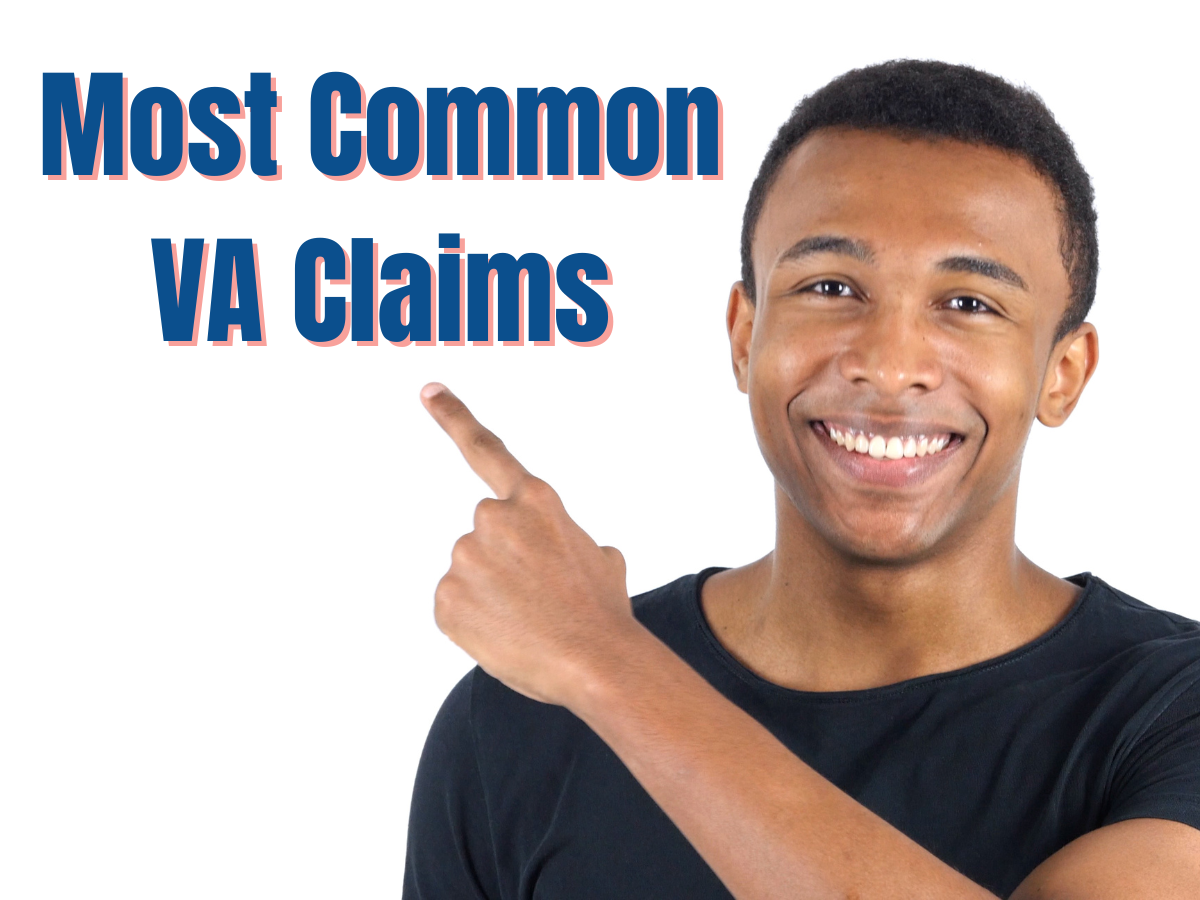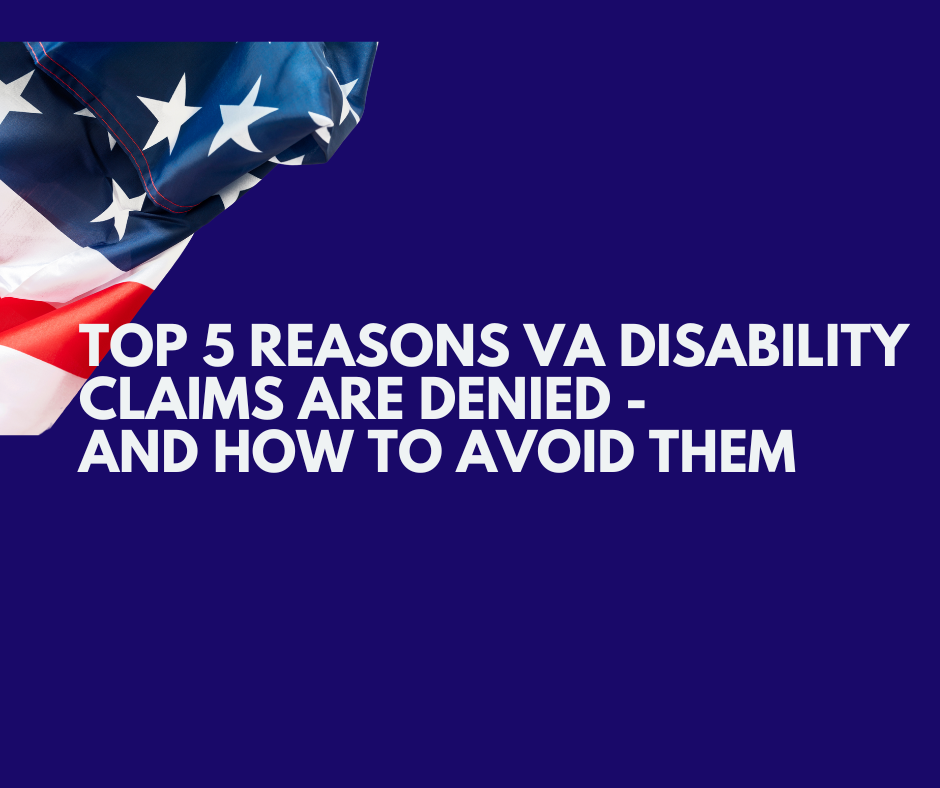Navigating the complex world of VA disability claims can be daunting for veterans who have bravely served their country. With various disability ratings, secondary conditions, and challenges faced in the claims process, it’s crucial to understand the vital steps and strategies to maximize the chances of approval. In this comprehensive guide, we’ll dive into the most common VA disability claims, factors contributing to high approval rates, strategies for success, and the role of VA-accredited attorneys, like Lawyers for American Vets, to help veterans get the benefits they deserve. Additionally, we will answer the question: what is the most approved VA disability?
Key Takeaways
-
Common VA disability claims include Tinnitus, Hearing Loss and Post-Traumatic Stress Disorder.
-
Factors that contribute to high claim approval rates are severity of condition, supportive medical evidence & clear service connection.
-
Strategies for successful claims include submitting comprehensive documentation, obtaining a Nexus Letter & consistent reporting of symptoms.
The Most Common VA Disability Claims

Understanding the most common VA disability claims can help veterans navigate the benefits process more efficiently. Among the numerous disabilities veterans may experience, three stand out as the most prevalent: Tinnitus, Hearing Loss, and Post-Traumatic Stress Disorder (PTSD). These conditions often have clear connections to military service, making them more likely to be approved for VA disability benefits.
Tinnitus
Tinnitus is the most common disability among veterans, affecting over 2 million individuals. This condition is characterized by the perception of sounds, such as ringing or buzzing, in the ears or head without any external source. Exposure to loud noises, head injuries, and medication side effects are some potential causes of Tinnitus.
The VA assigns a 10% disability rating for Tinnitus. Although this rating may seem low, it can significantly increase a veteran’s overall disability rating when combined with other service-connected disabilities. A link must be established between Tinnitus and active service to qualify for disability compensation for this common condition.
Hearing Loss
Hearing loss is another prevalent disability among veterans, often resulting from exposure to loud noises and machinery during military service. The VA ratings range for hearing loss varies from 0-100%, depending on the severity of the condition. Due to its clear link to active service, hearing loss is often considered one of the most straightforward VA disability claims.
To file a successful hearing loss claim, veterans must demonstrate a specific degree of hearing loss and establish service-connection. Audiometric tests and speech discrimination scores are used by the VA to rate hearing loss. With the appropriate evidence and documentation, veterans can receive disability compensation for service-connected hearing loss.
Post-Traumatic Stress Disorder (PTSD)
PTSD is a serious mental health condition that can arise from traumatic experiences encountered during military service. The VA rating for PTSD ranges from 0-100%, based on the severity of symptoms and their effect on daily life. A 100% rating for PTSD is a sign of serious impairment, both in the work and social areas. It suggests that the individual can no longer carry out regular activities and interactions with others..
To file a successful PTSD claim, veterans must provide evidence of in-service stress, a Statement in Support of Claim for Service Connection for PTSD, and a C&P Examiner’s completion of the DBQ for PTSD Initial. Demonstrating a link between PTSD and military service is vital to qualify for disability compensation for this common mental health disorder.
Factors Contributing to High Approval Rates

Several factors contribute to high approval rates for VA disability claims, including:
-
The severity of the service-connected condition
-
Supportive medical evidence
-
Documentation of the condition’s impact on daily life and work
-
Having a well-defined and well-documented connection between the condition and military service
Additionally, these factors may also boost the likelihood of approval.
Clear Service Connection
Approval for VA Disability Benefits heavily relies on a clear service connection. This connection indicates a direct correlation between a current disability or illness and its onset during active duty service. Establishing a distinct and well-documented relationship between the condition and military service can enhance the likelihood of a successful VA disability claim.
The nexus, or direct connection between a veteran’s disability and their active duty service, is essential for the VA to provide disability compensation, regardless of the severity of the condition. Providing evidence of this connection increases the chances of a successful claim.
Objective Diagnostic Tests
Objective diagnostic tests like audiometric tests for hearing loss are vital in affirming service connection and gauging the scope of disability. These tests provide objective data and measurements that can be used to make an accurate diagnosis, as opposed to subjective assessments that rely on the patient’s self-reporting or interpretation.
Objective diagnostic tests like laboratory tests, imaging studies, and physical examinations can furnish proof to back up a VA disability claim. Accurate test results aid in determining the severity of the disability and help establish a definite service connection, increasing the likelihood of claim approval.
Streamlined Claims Process
A streamlined claims process can guarantee that all pertinent documentation is submitted promptly, thus increasing the potential for a successful VA disability claim. This process involves reducing paperwork, utilizing digital platforms for claims submission and tracking, and automating processes when feasible. The aim is to expedite the claim process and decrease the requirement for manual intervention, making it one of the easiest VA disability claims experiences.
Veterans can benefit from faster processing times and better claim tracking by simplifying the claims process. This can assist veterans in getting their claims approved more promptly and with less difficulty.
Strategies for Successful VA Disability Claims

To increase the chances of a successful VA disability claim, veterans should consider employing various strategies. These strategies include obtaining a formal medical diagnosis supported by medical evidence, obtaining a Nexus Letter, and consistently reporting symptoms of the condition.
Medical Documentation
A formal medical diagnosis is the initial step in the process of filing a VA disability claim. Medical documentation, such as:
-
Federal and state records
-
Private medical treatment records
-
VA medical records
-
Hospital records
-
Other relevant medical records
should be submitted to provide tangible evidence of a condition or disability.
Having a VA-accredited attorney, like Lawyers for American Vets, review a VA claim prior to submission can provide assurance that the claim is accurate and complete, thereby increasing the likelihood of approval.
The chances of claim success can be significantly improved by providing all necessary medical documentation.
Nexus Letter
A Nexus Letter is a formal document, signed by a medical professional, that connects a veteran’s current medical condition to their military service. This letter is crucial in establishing a direct connection between a veteran’s disability and their active duty service for VA Disability Benefits.
Obtaining a Nexus Letter from a private provider is highly recommended, particularly when the disability was not diagnosed while in the military. This letter can be instrumental in providing the necessary evidence to establish service-connection and increase the chances of a successful VA disability claim.
Consistent Symptoms Reporting
Proving ongoing symptoms is crucial in VA disability claims. This can be done through medical history, evaluations, and consistent reporting of symptoms. Accurate and consistent reporting of symptoms is integral for the successful diagnosis and treatment of a condition.
Regularly reporting symptoms allows veterans to paint a comprehensive picture of their condition, which can enhance diagnosis, treatment, and the likelihood of a successful VA disability claim. Consistent symptoms reporting is an important strategy for veterans seeking disability benefits.
Secondary Conditions and Their Impact on Approval Rates

Secondary conditions are medical conditions that are caused or aggravated by a service-connected disability. These conditions can have an impact on approval rates for VA disability claims depending on the evidence presented to link them to the primary disability.
Some common secondary conditions include sleep apnea, hypertension, mental health conditions, and chronic pain.
Sleep Apnea and Hypertension
Sleep apnea and hypertension are common secondary conditions that can be linked to other service-connected disabilities, potentially increasing overall disability ratings. Sleep apnea is a sleep disorder characterized by pauses in breathing during sleep, while hypertension is a medical condition in which the blood pressure is abnormally high.
Veterans could potentially boost their overall disability rating and receive increased compensation by demonstrating that sleep apnea and hypertension are associated with other service-connected disabilities.
Mental Health Conditions and Chronic Pain
Mental health conditions and chronic pain can also be secondary to other service-connected disabilities, potentially increasing overall disability ratings. Mental health conditions commonly associated with VA disability claims include PTSD, Major Depressive Disorder, anxiety disorders, and cognitive disorders. Chronic pain conditions, such as chronic back pain, joint pain, and headaches, are also frequently associated with VA disability claims.
Veterans could potentially raise their overall disability rating and receive increased compensation by demonstrating that mental health conditions and chronic pain are secondary to other service-connected disabilities.
The Role of VA-Accredited Attorneys in Claim Approval

VA-accredited attorneys play a vital role in helping veterans navigate the claims process and increase their chances of approval. These attorneys can:
-
Assist veterans in understanding the claims process
-
Ensure that all necessary documentation is submitted promptly
-
Provide counsel on how to appeal a denied claim
Their knowledge and expertise can greatly benefit veterans seeking VA benefits from the VA.
Veterans can benefit from specialized knowledge, direction, and assistance throughout the claims process by engaging the services of a VA-accredited attorney. With their expertise, veterans can maximize their chances of receiving the VA disability compensation and other disability benefits they deserve.
Challenges Faced by Veterans in the Claims Process
Navigating the VA disability claims process can be challenging for veterans due to various obstacles, such as limited access to medical records and misconceptions about VA disability ratings. Understanding these challenges and working to overcome them can help veterans increase their chances of a successful claim.
Limited Access to Medical Records
Limited access to medical records can make it difficult for veterans to provide the necessary documentation for their claims. Some of the challenges veterans face when accessing medical records for VA disability claims include:
-
Delays in obtaining military records
-
Confusion regarding patient eligibility
-
Limited information on the claims process
-
Lack of electronic access to VA treatment records for non-VA examiners
Veterans can boost their chances of a successful VA disability claim by overcoming these challenges and ensuring that all necessary medical records are obtained and submitted.
Misconceptions About VA Disability Ratings
Misconceptions about VA disability ratings include:
-
The belief that having a VA disability rating would negatively affect future employment options
-
The belief that VA disability benefits are exclusively for veterans with severe disabilities
-
The belief that the VA disability rating is based solely on combat experience or being wounded in battle
These misconceptions can lead to confusion and frustration for veterans navigating the claims process.
Veterans can approach the claims process with confidence and enhance their chances of approval by debunking these misconceptions and understanding the true nature of VA disability ratings.
Summary
The world of VA disability claims can be complex and challenging, but with the right knowledge, strategies, and support, veterans can successfully navigate the process and receive the benefits they have earned. By understanding the most common claims, factors contributing to high approval rates, and the role of VA-accredited attorneys, veterans can maximize their chances of approval and secure the compensation they deserve. We hope this comprehensive guide has provided valuable insights and guidance to help veterans on their journey to claim the benefits they have rightfully earned.
Frequently Asked Questions
What is the most common 100% VA disability?
The most common VA disability claims are awards for Tinnitus, Hearing Loss, PTSD, Lumbosacral or Cervical Strain, Paralysis of the Sciatic Nerve, Scars (General) and Limited Range of Motion for the Knee and Ankle.
What is the most common VA disability rating?
The most common VA disability rating is 10%, with an average monthly payment of $165.92.
What conditions automatically qualify you for VA disability?
VA disability benefits cover a wide range of conditions including cardiovascular diseases, dental and oral conditions, digestive conditions, endocrine conditions, genitourinary and gynecological conditions, hemic and lymphatic conditions, infectious diseases, immune disorders, mental conditions, chronic back pain, breathing problems, severe hearing loss, scar tissue and loss of range of motion.
How can a Nexus Letter help with my VA disability claim?
A Nexus Letter can significantly improve the chances of a successful VA Disability Benefits claim by establishing a direct connection between a veteran's disability and their active duty service.
What factors contribute to high approval rates for VA disability claims?
High approval rates for VA disability claims are largely due to the severity of the service-connected condition, supportive medical evidence, documentation of the condition's impact on daily life and work, and a well-defined connection between the condition and military service.
If you or a loved one is struggling with a VA claim being denied, contact Lawyers for American Vets today for a free consultation. Let our experienced attorneys help you navigate the VA system and reach a favorable outcome.









